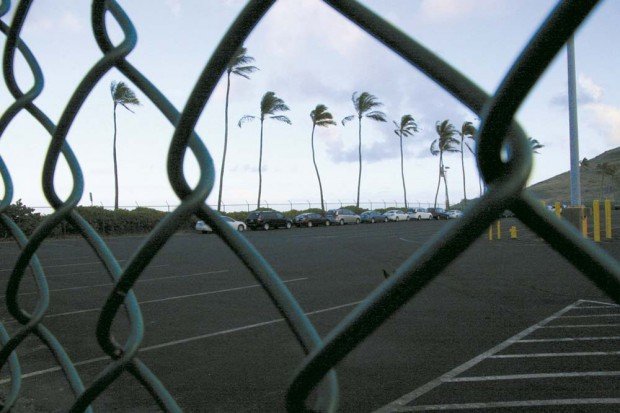LIHU‘E — Attorneys for two defendants accused of felony drug possession battled the prosecution’s team in a Monday hearing on a motion to suppress testimony and evidence. The case is against Michael Glenn Sullivan, 39, and Rolando Alegado Agustin, 41,
LIHU‘E — Attorneys for two defendants accused of felony drug possession battled the prosecution’s team in a Monday hearing on a motion to suppress testimony and evidence.
The case is against Michael Glenn Sullivan, 39, and Rolando Alegado Agustin, 41, both of Lihu‘e. They were arrested just after 7 a.m. on April 6, 2010, when police allegedly observed a white bag being tossed over a fence at Nawiliwili Harbor. That bag was later said to contain $1,144 in cash and 203.5 grams of cocaine, carrying a street value of roughly $20,000.
Sullivan is employed by Young Brothers, an inter-island shipping company with a port at Nawiliwili Harbor. He allegedly took the drugs that were hidden in the barge from O‘ahu and threw them over a fence to Agustin, who worked for The Gas Company, a nearby business at the harbor.
The two pleaded not guilty on June 29, 2010. They each face Class A felony first-degree promotion of a dangerous drug, seven counts of second-degree promotion of a dangerous drug, and seven counts of drug paraphernalia. The charges could bring up to 20 years in prison and a $50,000 fine.
Michael Green, an attorney for Sullivan, along with Michael Soong and June Ikemoto, attorneys for Agustin, questioned four of nearly a dozen witnesses. They worked from mid-morning until the court adjourned just after 4 p.m. to expose what they felt was a troubled investigation and criminal case.
Fifth Circuit Court Judge Kathleen Watanabe ordered the remaining witnesses to return for a Sept. 19 continuance to conclude testimony.
The Oct. 3 trial date may be pushed to Jan. 3 or later depending on the court calendar and logistical issues of the witnesses.
Deputy Prosecutor Samuel Jajich said the defense is accusing the Kaua‘i Police Department investigation of questionable means with producing probable cause in seeking a search warrant. He said this tactic is a fancy argument but does not meet the standard to require a Franks hearing to determine whether the police affidavit used to obtain a search warrant to find incriminating evidence was based on false statements.
The first witness was a security company representative who maintains the motion sensitive cameras that monitor the fence line of Young Brothers. He testified that he was asked to burn two copies of recordings taken at the time alleged narcotics activities occurred.
The cameras were said to record five minutes prior and after a movement is detected, and that approximately 28 days of footage are available before recording begins over the disk again.
Green argued that KPD should have ordered the 28 days recorded and not the minutes of one alleged activity. He also said the lack of adequate photo evidence of the crime scene and what he said are inconsistencies in placing people where they were said to be at the time of the alleged crime should have been better documented.
Green produced a disk supposedly containing the security footage of the crime but the courtroom computer and projector would not work with the disk. It is being held over until the next hearing and could require recalling some officers for testimony.
KPD officer Ginny Pia, who was in charge of the investigation, spent the longest time on the stand. She stated that tips from a confidential informant led officers into three years of surveillance and investigation. A March 16, 2010 incident produced evidence for a warrant and the eventual April 6, 2010 arrest following another tip that allegedly caught the two in the act at Young Brothers.
Green questioned the reliability of the unidentified informant in providing information on the activities of the defendants in the months prior to observation of suspect activity in the Young Brothers yard. He questioned two errors in the dates that appeared both in the affidavit and the warrant.
Pia said they were typos and Jajich added that the error is not evidence of wrongdoing on the officers’ request for a warrant.
Green questioned the reliability of the K9 unit in producing the scent of drugs that had been in a vehicle returning to Kaua‘i from O‘ahu via Young Brothers. Pia said the investigation produced observation of Sullivan which led law enforcement to suspect the vehicle.
The vehicle belonged to the state Department of Land and Natural Resources. Conservation officer Jeff Garcia reportedly was called in to pick up the vehicle and drive it to a K9 drug-sniffing team. The dogs detected that a narcotic substance had been in the vehicle, but not at that time.
Green and Soong questioned the reliability of the K9 team and — because of the error in the dates — whether the inspection had actually occurred. Pia deferred all questions about the K9 dog, its reliability and the process of vehicle inspection to the handler.
Soong also questioned the practice of KPD Narcotic and Vice as the only section that does not record or video police interrogations. He questioned the completeness of a two-and-a-half hour interview that was typed up in three-and-a-half pages.
He said the defendants were asked to read, edit and sign the statement, and that the complete interrogation recorded would offer no question of facts or whether the suspects ever wished to end questioning until an attorney was present.
KPD officer Alex Oliveira testified as to his role as the sole observer of the alleged throw of a “white package” by Sullivan from the Young Brothers yard over the fence to The Gas Company yard, where Agustin was allegedly there to pick it up. Oliveira was on a hill overlooking the yard with other officers in the bush-line below a scenic lookout area.
Questioning will continue with other investigation officers and material witnesses on Sept. 19.


